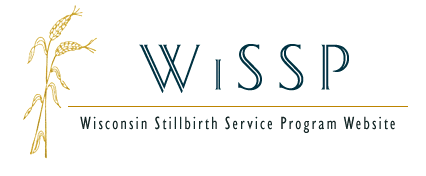At This Time, WiSSP Will Not Be Accepting New Referrals.
We encourage providers caring for families that have experienced a stillbirth to continue to collect information, especially placental pathology reports, autopsy, and laboratory studies and to refer families that have questions regarding a stillbirth or second trimester loss to a maternal fetal medicine specialist and/or medical geneticist who will be able to make use of that information.
To find a genetic counselor anywhere in the country, you can search on the National Society of Genetic Counselors website: http://www.nsgc.org/page/find-a-gc-search
To find a maternal fetal medicine specialist, you can search on the Society for Maternal Fetal Medicine website: https://www.smfm.org/members
There are several laboratories in the state of Wisconsin that can perform clinical SNP microarray on prenatal specimens and/or products of conception. These include:
- State Laboratory of Hygiene
http://www.slh.wisc.edu/ Offers both targeted and non-targeted prenatal and poc snp microarray - Wisconsin Diagnostic Laboratories
http://www.wisconsindiagnostic.com/ Offers prenatal snp microarray - Prevention Genetics
https://www.preventiongenetics.com/ Stepwise Comprehensive Miscarriage, Stillbirth & Neonatal Death NGS panel includes snp microarray as first tier followed by NGS sequencing for 40 genes associated with subtle or easily missed causes of fetal loss.
There are also many laboratories elsewhere that can accept samples from Wisconsin. Your local hospital may have established referral relationships with some of these laboratories.
WHAT SAMPLES SHOULD BE OBTAINED?
If there is any maceration, the placental sample will be the most useful. It should be from the fetal side, shipped fresh in tissue culture medium or saline.
Cord blood is useful primarily for intrapartum or immediate neonatal deaths. Postmortem samples from internal tissues or skin are valuable as a backup for additional studies in the future, but are not the primary source for cytogenetic studies. Backup tissues should be stored frozen, not fixed.
WHAT TEST SHOULD BE ORDERED?
There are now two different tests available for chromosome studies on products of conception.
- Karyotype—This is the same study we have been using routinely and, when done on POC, is virtually always covered by the mother’s insurance. Because it depends on tissue culture there is a 30% failure rate, which can be partially overcome by ordering reflex to fluorescence in situ hybridization (FISH) to rule out common trisomies.
- Snp Microarray—This is a newer test which detects subtle deletions and duplications missed on routine karyotype. Because it does NOT depend on tissue culture the success rate is much higher than for karyotype. The SNP array is now the test recommended by The American College of Obstetrics and Gynecology for evaluation of stillbirth and when done on POC is usually covered by the mother’s insurance. (It is important to specify SNP array as some older types of arrays did not detect triploidy.)
WHERE AND HOW SHOULD SAMPLES BE SENT?
You may use any laboratory preferred by your institution. You may wish to contact the laboratory directly for more specific instructions on specimen requirements and shipping. Most major laboratories offer SNP array on fresh or cultured tissue but only a very limited number can test fixed tissues. If you have difficulty identifying an appropriate laboratory, please contact the WiSSP director or any Genetic Counselor for assistance.
IS THERE OTHER TESTING TO CONSIDER?
Additional testing may sometimes be recommended based on findings from autopsy and/or WiSSP evaluation. This will usually require cultured cells or frozen tissue from which DNA can be extracted. Therefore it is useful when possible to obtain extra fresh tissue and/or to ask that the laboratory performing testing save any extra sample or tissue cultures until evaluation is complete. Commercial DNA banking is also an option. Recently one laboratory (PreventionGenetics) has developed a Comprehensive Sequencing Panel for Miscarriage, Stillbirth & Neonatal Death. This is a sequential test which begins with SNP array and then proceeds to testing for other genetic disorders which are implicated as causes of stillbirth, yet are difficult to detect during routine examination of a small or macerated fetus (such as various causes of hydrops, fetal akinesia, and sudden cardiac death). If an abnormality is detected on the SNP array, insurance is billed only for that portion of the test. In cases with a normal SNP array, the same sample is used for the second tier of testing. If a SNP array or chromosome studies done elsewhere are normal, just the second tier can be ordered.

